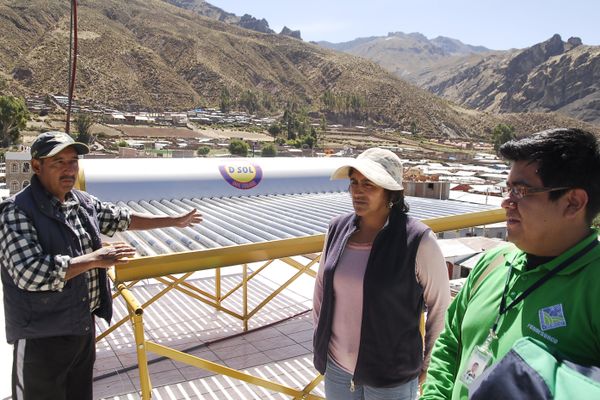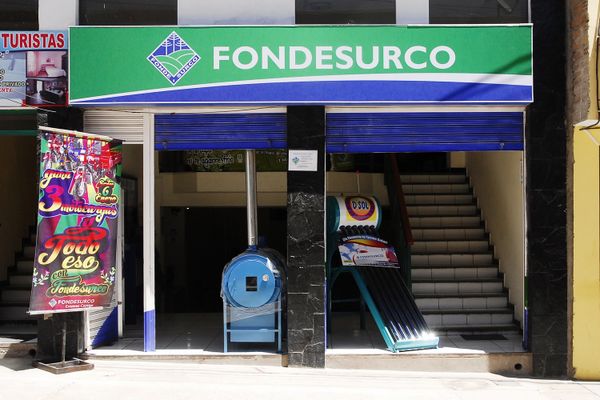Solar Water Heaters – Project Examples
Overview
The following project examples of solar water heatinginitiatives show that programmes in the field of solar thermal energies are successful.
Peru
Project Example: Energising Development Peru
Productive Use: The Colca River Hotel
It really is a great difficulty living in cold areas where you do not have hot water. I remember a trip where all our entire team passed many days without bathing. It was already difficult to bear the cold, but the thought of ice water on the body was impossible to bear.
In Peru, most of the people of the Andean highlands live this reality every day and the lack of hot water also reaches to travelers and tourists seeking for comfort and shelter in these remote locations, since in this area many communities are enthusiastic to exploit their potential touristic routes and offer their landscapes for backpacking guides.
Thus we arrive at Chivay, capital of Caylloma province in the department of Arequipa, today a well-known entry point to explore the heights and depths of the Colca Canyon and its surrounding towns. Chivay reaches 3,635 masl. and despite its sparse atmosphere, visitors are shown as a cozy and picturesque place surrounded by mountains and people in colorful traditional costumes.
Israel Huaraya and Ana Morón own and run the hotel in Chivay called Colca River. “We look for ways in which to better serve our guests. Here you can get very cold and people cannot clean themselves if there is no hot water, as it reaches zero degrees easily”, they tell us.
And as they dared to put the hotel name in English, did not hesitate to buy a solar water heater. "We saw the Fondesurco promotion and I opted for the largest heater, which is 650 liters. When we get large groups, we can accommodate up to 40 people and everyone wants to bathe”, says Israel.
“The water heater works perfectly. We installed it on the roof and all went well. We have 18 rooms, all with hot water, because from the beginning we had decided to have hot water. If we are working with tourism, we have to provide hot water. There are over 100 hotels in Chivay, for all tastes and prices, and most already have hot water”, he adds.
We climbed to the roof to see the water heater and he told us that initially they used electricity, but it was a large expense. Some hotels also use gas, but many are opting for solar energy, which Israel says is the most economical way. “It pays for itself and requires little maintenance", he says.
The Fondesurco microfinance offers installation of the solar heaters and provides a guarantee of five years. Moreover, Chivay enjoys a blue sky and a bright sun, which is also an assurance that there will be a constant source of heat for hot water stored in the tank. Isarel and his wife agreed to a twoyear financing with nothing down and find it quite manageable. Also, maintenance is very simple and consists mainly in cleaning the tubes.
Ana also tells us that her 11 year old son is excited about the heater. “Now, he can bathe everyday after coming home from school. The heater helps a lot and there is enough hot water for everyone”, he says.
Productive Use: Rooms for Rent
We walked a few more blocks down the small town, the capital of the valley, and found Mrs. Antonia at home. She also provides a hosting service to people who come to stay for seasons, such as public employees, teachers and sanity workers. “I use solar hot water for dishwashing in the kitchen and laundry, but especially as a service for my guests”, she says, as we enjoy the view from the roof of her home.
She installed the solar water heater just a few months after opening the guest house, since potential guests requested hot water. Antonia has nine rooms rented , that is, all of her two-floor house. “Having hot water is virtually a requirement to rent rooms. People bathe, especially in the evening and the morning”, she says. She acquired her solar water heater two years ago and has finished paying off the Fondesurco financing.
Household Family Use
We return to the village and decided to take a motorcycle taxi to go to the house of Helena Huaracha, who lives outside of Chivay, in a place called “Pueblo Joven de Chivay”, a sort of new district next to the town. We have had the solar water heater for more than a year. It gives intense heat and the water is always boiling. All year we have hot water, especially in frosty weather for bathing and washing clothes”, she tells us.
She and her husband decided to buy a solar water heater when information came from a promotional campaign by Fondesurco. In six months they paid off the loan. She also runs a small shop and her husband works in a hotel. “My husband takes care of the water heater, he does the maintenance, cleans the tubes or removes garbage that sometimes comes with the water and prevents the normal flow of the pipes. Also, installation was easy because we had everything ready at home”, adds Helena as she offers a soda from the counter of her small shop on the side of the house.
We also asked her what it meant in their lives to have daily hot water. Helena is 33 years old , has four children and was born in the town of Chivay, where she has spent all her life. “When we did not have the solar water heater, we had to heat water with gas or go to the hot springs, but we could not carry the babies every day. Now, the solar water heater means a lot of savings. We do not spend on electricity, since it is totally heated by the sun”, she says, clearly emphasizing the benefits offered by this technology.
She tells us that the heater even keeps the heat at night, despite the low temperatures. “Sometimes you can feel even freezing temperatures outside, but the water is still warm in the morning when we open the drain, even in the winter months when the cold is intense”, she says.
Eventually, she would like to open a hotel, because her husband knows this business. “My husband works in a local hotel and there the water was heated with gas, but they now have three large solar water heaters. It is one of the leading hotels in the city”, she explains.
Gradually, our visit to the village ends and these three stories leave no doubt that hot water is possible, even in the most remote areas of Peru. Undoubtedly, the abundant sunshine that distinguishes the country, the “Inti”, which is the word for Sun used by the Incas, is a good ally for it. In addition, various organizations and microfinance institutions, such as Fondesurco are present to promote and provide alternative technologies that enable new ways to use the solar energy source, for example to get hot water, essential to our daily life, and even more so, in the country highlands.
Credits for SWH: Fondesurco, a microfinance institution
“The solar water heaters work pretty well. Here it is quite cold and very necessary. We offer heater of 120 liters for family use, which is our most required product. For example, in Madrigal, a neighboring district, people have already begun to try them and also to spread the word, because the credit is a good opportunity. In addition, the technician is included in the installation service. In general, we try to reach all the 24 districts of the province".
Rosa Luz Puma Aquino, Customers Service
The information about SWH in Peru was originally published by EnDev Peru in the fifth edition (March 2014) of Amaray Magazine. Further information of Fondesurco microfinance can be found in MFI for Energy Technologies in Peru.
Mexico
Te creemos Financiera Popular
- Year of foundation: 2005
- Number of offices: 80
- Number of Borrowers (2013): 55,940
- Average Loans Size (2013): 967.0 USD
Average Customers
- 58% dedicates to trading activities.
- 61% are women
- 74% have an education level below secondary school.
- Average income: <800 USD/month
Solar Water heaters and efficient refrigerators
- Price range: 500-1,000 USD and 650-5,000 USD
- 6 month pilot phase: 398 credits for SWH
- 86% of clients were satisfied with product
- Saving 13 USD/month for LPG and 10 USD/month for biomass
Tunisia
PROsol
In Tunisia, the programme PROsol has provided SWH to 450 companies in the tertiary sector (hotels, swimming pools, hammams, etc.) via loans. It grants five years to pay back the loan through their monthly STEG electricity bill, which is a key success factor of the financial scheme, because it is a relatively reliable method of refinancing the thousands of loans.
The Agency for the Environment and Energy Control has published information factsheets, available in French here.
PROSOL’s effects on the Tunisian market as follows:
- Increased number of manufacturers (9 in 2015), and 50 different suppliers of solar thermal systems offering more than 200 different solar thermal models.
- Accreditation of 1,100 installers (5 times more than in 2005)
- Furthermore, the Prosol programme is financed through avoided fossil fuel subsidies that are more than covering government support for SWH.
See also: Opportunity Study for Solar Thermal Systems in the Tertiary and Industrial Sector
Further Information
- Solar portal on energypedia
- All solar heater articles on energypedia
- Solar Water Heater
- Solar Water Heaters Worldwide - Market Development
- Solar Water Heaters in Latin America - Market Development





















